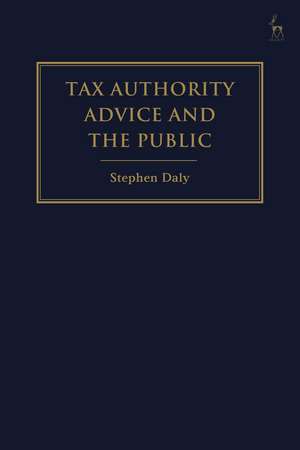Tax Authority Advice and the Public
Autor Stephen Dalyen Limba Engleză Hardback – apr 2020
Preț: 569.70 lei
Preț vechi: 778.95 lei
-27% Nou
Puncte Express: 855
Preț estimativ în valută:
109.01€ • 118.78$ • 91.86£
109.01€ • 118.78$ • 91.86£
Carte disponibilă
Livrare economică 02-16 aprilie
Preluare comenzi: 021 569.72.76
Specificații
ISBN-13: 9781509930531
ISBN-10: 1509930531
Pagini: 264
Dimensiuni: 156 x 234 mm
Greutate: 0.55 kg
Editura: Bloomsbury Publishing
Colecția Hart Publishing
Locul publicării:London, United Kingdom
ISBN-10: 1509930531
Pagini: 264
Dimensiuni: 156 x 234 mm
Greutate: 0.55 kg
Editura: Bloomsbury Publishing
Colecția Hart Publishing
Locul publicării:London, United Kingdom
Caracteristici
Explores HMRC's role in tax collection, explains the deficiencies in the current system and assesses potential reforms which could be adopted in order to alleviate existing problems
Notă biografică
Stephen Daly is Lecturer in Corporate Law at the Dickson Poon School of Law, King's College London.
Cuprins
1. Introduction I. Introduction II. Background III. Justification for StudyIV. Book Outline V. Conclusion 2. What is HMRC Advice? I. Introduction II. Individual Advice III. General Advice IV. Conclusion 3. The Role of HMRC Advice I. Introduction II. Understanding HMRC's Role III. The Desirability of HMRC Advice IV. A Normative Framework for HMRC Advice V. Conclusion 4. Problems with Advice I. Introduction II. Correctness III. Clarity IV. Accessibility V. Conclusion 5. ScrutinyI. Introduction II. Parliamentary Scrutiny III. The Adjudicator and Ombudsman IV. The Tribunals and CourtsV. Taxpayers and Representative Groups VI. Conclusion 6. Remedies I. Introduction II. Public Law III. Private Law IV. Non-court Remedies V. Conclusion 7. ReformsI. Introduction II. Binding Rulings III. Proposals in Respect of Individual and General Advice IV. Conclusion 8. Conclusion
Recenzii
[R]arely will a reader find such a finely detailed analysis of how existing UK proposals, Australian practices and other ideas might be given practical applicability in the UK with minimal disruption. This is sensitive and fine-grained academic impact work and deserves the widespread attention that it is likely to command.
The book is not only important. It is also well researched, very comprehensive and delves deep into problem and solution statements.
This is a nicely structured book on the provision of advice by HMRC which explains the deficiencies in the current system. A useful normative framework is developed for assessing reform proposals. Moreover, it offers a solid basis for comparison and assessment of the legal framework and actual practice of tax authority's advice in other jurisdictions.
That Daly's work can both say and do something substantive for tax law and tax law scholars, while also causing others, like me, who research much further afield, to sit back and pause is a testament both to the crafting that has gone into the text and also to the universality of the big-ticket issues it addresses: power, law, and discretion.
The book is not only important. It is also well researched, very comprehensive and delves deep into problem and solution statements.
This is a nicely structured book on the provision of advice by HMRC which explains the deficiencies in the current system. A useful normative framework is developed for assessing reform proposals. Moreover, it offers a solid basis for comparison and assessment of the legal framework and actual practice of tax authority's advice in other jurisdictions.
That Daly's work can both say and do something substantive for tax law and tax law scholars, while also causing others, like me, who research much further afield, to sit back and pause is a testament both to the crafting that has gone into the text and also to the universality of the big-ticket issues it addresses: power, law, and discretion.
